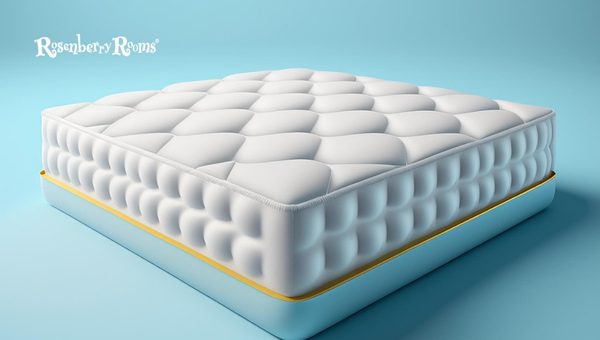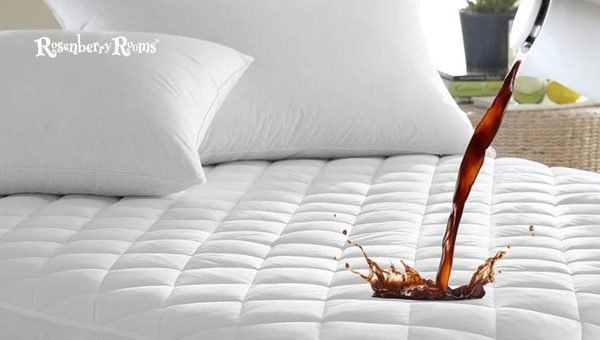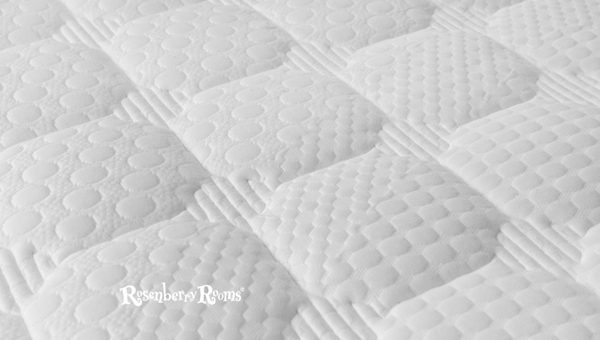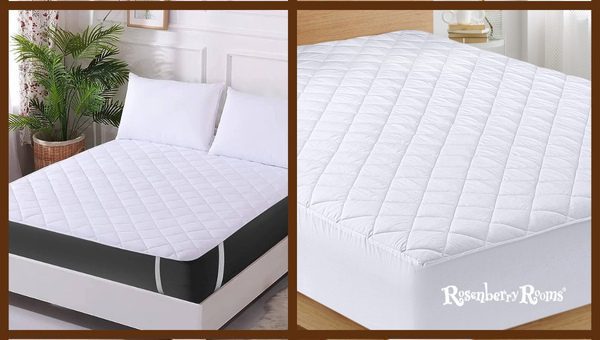Buying the best bedding items can be complex, especially when choosing between a mattress pad and a mattress protector. Both have unique features and benefits catering to different needs and preferences. There's more to this choice than just a product label; understanding the specifics in the "mattress pad vs mattress protector" debate is integral to finding what works best for your sleep routine.
Each item provides extra comfort and plays a significant role in ensuring a good night’s rest. They also come with particularities that could substantially affect your sleeping experience.
Your decision should rely on your comfort preferences and consider factors like allergen control, bedbug prevention, and temperature regulation. Let’s clarify the differences.
Contents
A mattress pad is a removable bedding item placed on top of a mattress for added comfort and protection. It serves multiple purposes, including improving the comfort level of a too-firm or old mattress, protecting the mattress from stains and spills, and providing an extra layer of support.
Usually made from materials like cotton, down, or memory foam, mattress pads come in various sizes to fit different beds.
They are easy to install and maintain, and some models even offer features such as cooling technology or allergy resistance. A good-quality mattress pad can enhance sleep quality and prolong the lifespan of your mattress.

A mattress pad is designed to align with your unique comfort needs, like a favorite pair of shoes that fit you perfectly.
By considering the various types of mattress pads available, you can ensure an upgrade to your sleeping experience tailored just for you. Here, we delve into details about what each type has to offer.
From cooling design to hypoallergenic innovation, the perfect mattress pad is right around the corner. Now that you’re acquainted with each type's features, it should be easy to determine which would suit your needs.
Also Read: Is It Safe To Spray Alcohol On Mattress? 2025 [Alternatives]

A mattress pad is not merely an accessory or an investment in luxury—it offers many proven benefits that justify its place in your bed setup.
Slipping a mattress pad onto your bed unlocks the potential for enhanced sleep quality and increased mattress longevity. Here’s the rundown on the numerous advantages of mattress pads:
It’s safe to say that investing in a mattress pad could be the sleeping game-changer you've been looking for.
A mattress protector is a removable bedding accessory that encases or sits on top of a mattress to safeguard it from various forms of damage.
These include spills, dust mites, bed bugs, allergens, and body fluids. Made from materials like cotton, polyester, or vinyl, mattress protectors are available in different sizes to accommodate all types of beds.
They can be waterproof or water-resistant and offer cooling or hypoallergenic features. By using a mattress protector, you can extend the life of your mattress and maintain a healthy and hygienic sleeping environment.

Just as you shield your gadgets and appliances to retain their lifespan and appeal, it's smart to safeguard your mattress.
But for that, you need the right kind of armor! In this quest for protection, let’s look at the various types of mattress protectors available, each with unique features designed to serve specific needs.
Knowing your protector types can steer you toward the restful sleep you deserve, whether it's waterproof resistance or hypoallergenic attributes you prioritize. With this knowledge, choosing the right mattress protector for your needs should be much easier.
A mattress protector is not just an accessory for your bed. Think of it as an insurance policy for your mattress - it helps preserve its lifespan, offers protection from various external factors, and can significantly improve the quality of your sleep. Given its importance, let's delve into the key advantages a mattress protector has to offer:
In addition to these crucial benefits mentioned above, spending on a good quality mattress protector becomes pocket-friendly in the long run by saving you from needing early replacements due to damage or wear and tear. Investing in one is conducive to promoting healthier sleep and making a smart budgeting move.

Whether a mattress pad or protector better suits your needs hinges on your specific comfort and maintenance priorities.
While a mattress pad principally enhances comfort, a mattress protector provides a defensive layer against allergens, liquids, and wear and tear. Therefore, the choice ultimately comes down to your unique preferences and lifestyle.
Having a mattress pad can significantly improve your sleeping experience. They’re not just for primary beds in main bedrooms—quite the contrary!
Knowing where to use a mattress pad in your home not only maximizes comfort but also elongates the lifespan of your mattresses. Here are some specific situations where using a mattress pad could make all the difference:
An older mattress can be given a new lease on life with the help of a mattress pad. As mattresses age, their comfort level decreases, and their springiness gets lost. So, suppose you're dealing with an old, sagging mattress.
In that case, adding a good quality memory foam or latex pad can provide much-needed cushioning and support, enhancing the firmness of your sagging mattress.
A guest room should be as comfortable and inviting as possible for visiting friends and relatives. Adding plush cotton or down pads on guest beds provides an extra layer of luxury for sleeping comfort that will make them feel right at home. These pads also protect against accidental spills or stains created by visitors' carelessness.
College dormitory beds aren’t known for their supreme comfort—quite the opposite. If you've lived on campus, you'll know how tough it can be to achieve peaceful sleep on those overly firm mattresses often found in dorm rooms.
A breathable cotton or cooling gel-infused memory foam pad can make a difference by alleviating pressure points and regulating temperature.
Your bed needs to feel cozy during those frosty winter nights. Heated mattress pads provide extra insulation that helps maintain heat during sleep, effectively shooing away wintry cold from your bed space. You can adjust the heat settings based on preference, making it perfect for cold climates.
If you wake up with stiffness and pain or feel the pressure on your back, hips, or shoulders, a mattress pad could be your life-saver.
Opting for memory foam or latex pads that contour with your body can provide extra cushioning to soothe soreness and reduce the risk of waking up with muscle aches or stiffness.
The usefulness of a mattress pad extends beyond supreme comfort; it influences sleep quality, extends mattress life span, and better caters to precise preferences. By knowing where to utilize these wonderful sleep aids, you can truly maximize their benefits.
You've weighed the benefits and decided a mattress protector is worth the investment. But you might be wondering, where specifically should you use it?
Though versatile in their application, there are certain situations where a mattress protector proves especially beneficial. Let's discuss.
Having a mattress protector is an absolute lifesaver when dealing with young children or toddlers in their potty-training stages.
It provides a waterproof barrier preventing accidents from soaking into and permanently staining your mattress during the night. A quick wash of the protector makes your bed fresh and clean again!
If you live in an area with high humidity levels or perhaps someone in your house tends to spill water or other liquids often, using a mattress protector becomes mandatory for the health of your mattress.
It helps guard against mildew and mold that thrive in damp environments by keeping excess moisture away from your mattress.
Allergens such as dust mites can nest deep within mattresses, causing havoc for people suffering from allergies or asthma.
Mattress protectors act as a guard between allergens and sleepers, creating an effective barrier against these pesky irritants.
Unconditional love from your furry companion often comes paired with some unsolicited extras on your bed. Pet hair, dander, and dirt tracked in from outside can all accumulate on your bed over time.
A mattress protector helps keep this "added fluff" off the mattress, ensuring cleanliness despite pet shenanigans.
Maintaining optimal hygiene is crucial in places such as hotels or rental properties where many people use beds over time.
Mattress protectors offer an easy way to achieve this. They can be removed and cleaned regularly, helping to keep the mattress in its best condition for longer.
Whether you need a mattress pad or a protector depends on your needs. If you're seeking enhanced comfort and softness, a mattress pad can help, providing an extra cushioning layer.
On the other hand, if you're looking for protection against spills, stains, allergy-causing particles, or dust mites, then a mattress protector would be more beneficial. It's also helpful in maintaining the warranty of a new mattress.
For optimal benefits, you may consider using both - a mattress protector for safeguarding your investment and a pad for added comfort. The protector can shield both the mattress and the pad from potential damage.
The main distinction lies in their purpose; a mattress pad enhances comfort, whereas a mattress protector protects your mattress from liquids, stains, allergens, and bedbugs.
You can use both simultaneously for an added layer of comfort and protection.
While not mandatory, both items can enhance your sleep quality by providing additional comfort (pad) or protecting your investment from potential damage (protector).
Most are machine-washable for easy care, but it's always best to check the manufacturer's instructions before cleaning.
A protector shouldn't significantly alter the feel of your bed, but a pad may add softness or firmness depending on its material and thickness.
Both mattress pads and protectors are valuable bedding items with unique functionalities. A mattress pad enhances comfort, while a mattress protector offers robust protection against spills, allergens, and wear.
The choice between the two ultimately comes down to your specific needs and preferences. Always remember that a good night's sleep goes a long way in maintaining health and overall well-being, so choose wisely and select the option that promises you the best restful experience.